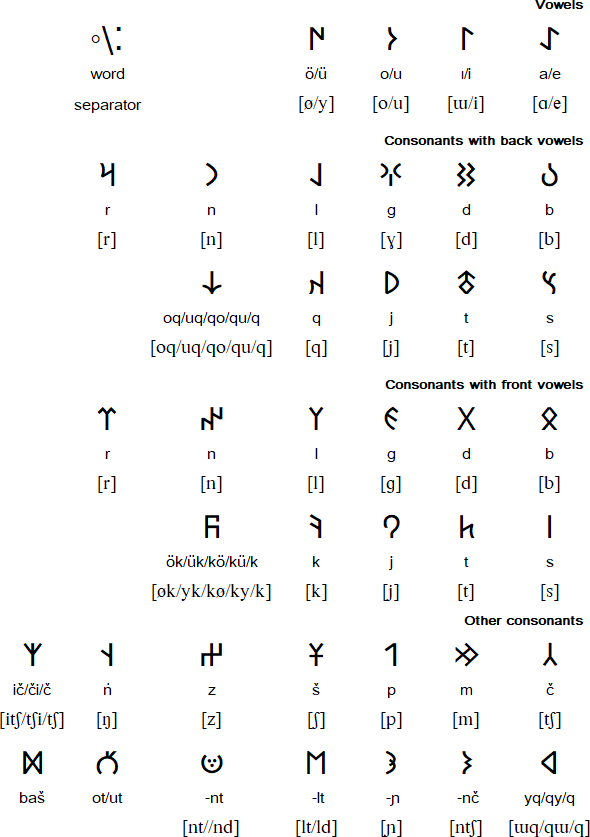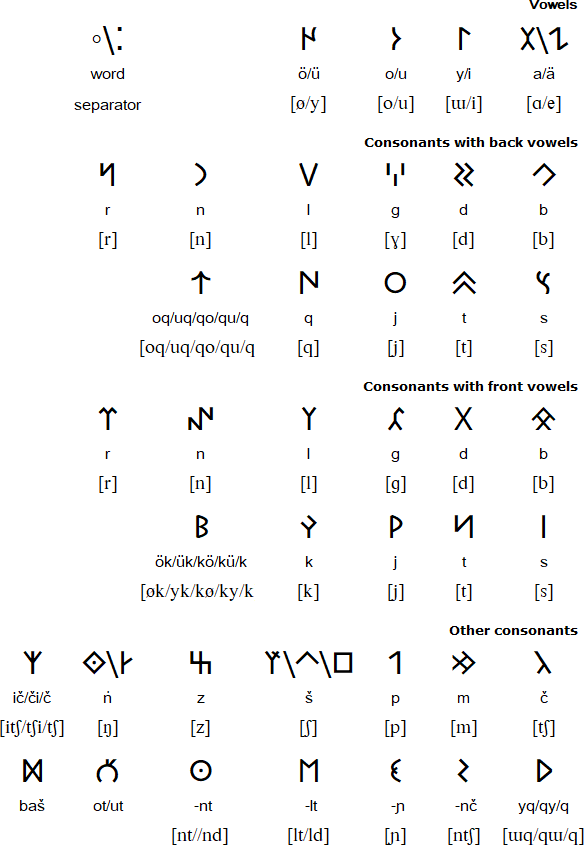The earliest known examples of writing in any Turkic language were found in the Orkhon river valley in Mongolia in the 19th century. They date from the early 8th century AD and the script in which they are written is known as the Orkhon alphabet, the Old Turkic script, the Göktürk script, or the Orkhon-Yenisey script. Inscriptions dating from the later 8th century AD in a slight variant of the Orkhon alphabet, known as Yenisei or Siberian runes, have also been found around Yenisei and other parts of Siberia.
Because of a superficial resemblance to the Runic alphabet, the alphabet is also known as Orkhon or Turkic runes. This resemblance is probably a result of the writing materials used - most inscriptions are in hard surfaces, such as stone or wood, and curved lines are difficult to inscribe in such surfaces.
The Orkhon alphabet is thought to have been derived from or inspired by a non-cursive version of the Sogdian script. By the 9th century AD, the Orkhon and Yenisei alphabets were replaced by the Uighur alphabet, which developed from the cursive version of the Sogdian script.


Download an alphabet chart for Old Turkic (Excel)

Türk Oguz begleri, bodun, eşidin üze Tengri basmasar asra yir telinmeser Türk bodun ilinin, törüngün kim artatı udaçı erti?
A recording of this text by Görkem
Türk Oğuz beyleri, kavmi, işitin; üstte gök (Tanrı) bastırmasa, altta yer delinmese Türk kavmi; ilini, töreni kim bozabilirdi?
Türk Oguz chieftains, clans, listen; unless the sky (Sky is also God) crushes, the ground punctures Turk clans; who could ever destroy your land and law?
Information about the Old Turkic language and alphabet | Numbers
Information about the Orkhon alphabet and Old Turkic language
http://en.wikipedia.org/wiki/Old_Turkic_script
http://gokbeyuluc.wordpress.com
http://fankibiber.wordpress.com/
http://kokturukce.blogspot.com/2008/09/gktrk-yazlarnn-harflerinin-kkeni-4.html
https://en.wikipedia.org/wiki/Irk_Bitig
Orkhon fonts and keyboard layouts
https://bitigchi.github.io/oldTurkic.html
http://www.gokturkceogreniyorum.com/
https://www.academia.edu/36844791
The Little Prince in Old Turkic
http://www.petit-prince.at/pp-tuerk-goektuerk.htm
Altay, Äynu, Azerbaijani, Bashkir, Chagatai, Chelkan, Chulym, Chuvash, Crimean Tatar, Dolgan, Fuyu Kyrgyz, Gagauz, Ili Turki, Karachay-Balkar, Karaim, Karakalpak, Karamanli Turkish, Kazakh, Khakas, Khalaj, Khorasani Turkic, Krymchak, Kumandy, Kumyk, Kyrgyz, Lop, Nogai, Old Turkic, Qashqai, Romanian Tatar, Salar, Shor, Siberian Tatar, Soyot, Tatar, Teleut, Tofa, Turkish, Turkmen, Tuvan, Urum, Uyghur, Uzbek, Western Yugur, Yakut (Sakha)
A-chik Tokbirim, Adinkra, ADLaM, Armenian, Avestan, Avoiuli, Bactrian, Bassa (Vah), Beitha Kukju, Beria (Zaghawa), Borama / Gadabuursi, Carian, Carpathian Basin Rovas, Chinuk pipa, Chisoi, Coorgi-Cox, Coptic, Cyrillic, Dalecarlian runes, Elbasan, Etruscan, Faliscan, Fox, Galik, Georgian (Asomtavruli), Georgian (Nuskhuri), Georgian (Mkhedruli), Glagolitic, Global Alphabet, Gothic, Greek, Hurûf-ı munfasıla, Irish (Uncial), Kaddare, Kayah Li, Khatt-i-Badí’, Khazarian Rovas, Koch, Korean, Latin, Lepontic, Luo Lakeside Script, Lycian, Lydian, Manchu, Mandaic, Mandombe, Marsiliana, Medefaidrin, Messapic, Mongolian, Mro, Mundari Bani, Nag Chiki, Naasioi Otomaung, N'Ko, North Picene, Novo Tupi, Nyiakeng Puachue Hmong, Odùduwà, Ogham, Old Church Slavonic, Oirat Clear Script, Ol Chiki (Ol Cemet' / Santali), Old Italic, Old Nubian, Old Permic, Ol Onal, Orkhon, Osage, Oscan, Osmanya (Somali), Pau Cin Hau, Phrygian, Pollard script, Runic, Székely-Hungarian Rovás (Hungarian Runes), South Picene, Sutton SignWriting, Sunuwar, Tai Viet, Tangsa, Todhri, Toto, Umbrian, (Old) Uyghur, Wancho, Yezidi, Zoulai
Page last modified: 15.03.23
[top]
You can support this site by Buying Me A Coffee, and if you like what you see on this page, you can use the buttons below to share it with people you know.

If you like this site and find it useful, you can support it by making a donation via PayPal or Patreon, or by contributing in other ways. Omniglot is how I make my living.
Note: all links on this site to Amazon.com, Amazon.co.uk
and Amazon.fr
are affiliate links. This means I earn a commission if you click on any of them and buy something. So by clicking on these links you can help to support this site.
[top]